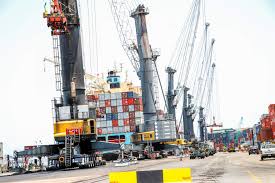In the first days of the coronavirus pandemic, world health officials feared for how Africa would fare against another quick spreading virus– a premonition stemmed from the continent’s struggles with previous epidemics such as Ebola and the Marbung virus.
With initial high rates of transmission and excessive overcrowding in parts of the continent, coronavirus was expected to quickly overwhelm Africa’s public health systems when the virus first appeared there last February. However, the African nations acted early on to slow the spread across the continent.
Today, Africa has less than 100,000 total deaths related to coronavirus with an average of 617 daily deaths reported this past week. Africa, as a continent, is managing the pandemic far better than all other continents and even some individual countries with admired healthcare systems, such as the U.S. with 3,229 average deaths or the U.K. with 985, according to data from Johns Hopkins University Center for Systems Science and Engineering.
“The initial disease prediction models painted a very bleak picture of severe devastation of lives and economies in Africa,” Dr. Sam Agatre Okuonzi, Arua Regional Referral Hospital Uganda, said in mid-September during a World Health Organization news briefing. “But the reality is starkly different.”
Part of the continent’s success in combating the virus can be attributed to “the gift of time,” according to Dr. Thumbi Mwangi, senior research fellow at the University of Nairobi’s Institute of Tropical and Infectious Diseases. In an interview with Reuters, the doctor credits preparation as Africa watched COVID-19 widely affect other continents before making its way to Africa.
The first case of COVID-19 in sub-Saharan Africa was reported in Nigeria on Feb. 28 and it prompted most African countries to implement severe measures to combat the virus almost immediately. Most public safety orders included social distancing, mandated face masks, frequent handwashing, avoiding crowds/gatherings and traveling restrictions.
Schools were ordered shut in Nigeria’s capital of Lagos after only eight confirmed cases in the entire country, and Kenya shut all schools after only one confirmed case. Last March, Lesotho, a country in southern Africa, declared a state of emergency prior to having any reported cases of COVID-19; and its first case was not reported until May, after a lockdown was lifted.
“Governments took early, quite drastic action through the lockdowns at great cost to their economies,” Dr. Moeti, WHO’s regional director for Africa, said in September’s briefing.
Africa’s youthful population likely also played a role in containing the virus and slowing its spread. Worldwide, COVID-19 related deaths are most often seen in people over 80. Almost 91% of reported coronavirus cases in sub-Saharan Africa occur in those below 60 and “over 80% are asymptomatic,” according to WHO. Compared to roughly 40% of COVID positive Americans who are asymptomatic.
“We have [in Africa] about 3% of the population aged over 65 years,” said Dr. Moeti. In other countries, with larger elderly populations, assisted care facilities became breeding grounds for the coronavirus and allowed for a kind of superspreading that does not exist in Africa.
Bittersweet, experts are also attributing the continent’s success in coronavirus preparedness to its past experiences handling epidemics. WHO cited the 2014 Ebola outbreak in west Africa as “the largest, most severe and most complex Ebola epidemic” in history with more than 28,000 people infected between 2014 and 2016, and over 11,000 total deaths. African countries were already on high alert to mass illness due to the Democratic Republic of Congo’s recent Ebola outbreak. As a result, several governments had already mastered enforcing mass public health action such as contact tracing and isolating the infected.
“Based on what we have seen so far [in Africa] it is unlikely that we are going to see anything at the scale that we are seeing in Europe—both in terms of infections and mortality,” said Rashida Ferrand, a London School of Hygiene and Tropical Medicine professor working in Zimbabwe.
However, John Nkengasong, Director of the Africa Center for Disease Control and Prevention, warns against complacency with African nations. In a piece published in Nature back in April, Nkengasong cites the intercontinental lack of solidarity in the race for PPE and vaccines as a reason for Africa’s expected failure. He wrote in the journal, “If Africa loses, the world loses.”
Nigeria
Nigeria is Africa’s most populous state with a reported population of 201 million in 2019. The country banned interstate travel and set a nationwide curfew early in the pandemic. According to Reuters, COVID-19 infections are decreasing in Nigeria. With 1282 new cases reported on a daily average, the country is at 78% of its peak daily average reported on January 26. It is one of Africa’s top faring countries with an average daily death toll of nine in the past week.
In October, Nigerian scientists developed a novice way of testing for coronavirus. The newer test offers quicker results and is less than 20% of the cost of the initial test. Nigeria has often pioneered new medical advances to directly combat prevalent unique medical concerns.
Michelle Onwuka, a 21-year-old Nigerian citizen, acknowledges her government for the steps it has taken in slowing the spread of the coronavirus within the country’s borders. She says that though most Nigerian civilians believe the virus to be a hoax, country officials are actively updating policy related to the pandemic. “The government just recently placed a law that anyone seen not wearing a mask would be arrested and put in jail for six months.” However, Onwuka believes the new policies are not being enforced to the extent that they should be.
South Africa
South Africa’s reported coronavirus cases at less than 10% of U.S.’ reported cases. The country enforced one of the world’s strictest lockdowns in March when only 400 cases were confirmed in the country. The lockdown consisted of bans on alcohol sales as well as banned recreational activities such as dog-walking and public jogs.
Today, the country’s average number of daily deaths has fallen by more than 250 in the past three weeks; this is 44% of its previous peak. Infection rates are also on a decline in South Africa. 3,796 cases are reported as a daily average, 20% of its peak on January 10.
Gabon
In Gabon the government has “installed social distancing, a curfew from 8 pm to 6 am mandated masks, and proper hand sanitizing before entering any store or facility,” said Bruccia Nfourou, a 25 year old Gabonese citizen. A fine is issued to anyone caught breaking new policy. Nfourou acknowledges her government for doing the best it can to slow the spread given the resources and circumstances within the country, but also attributes some of the country’s success in coping through pandemic to luck.
Gabon reported its first cases of COVID-19 on March 12. It is currently reporting its highest number of new infections since July. The country is reporting an average of 101 new cases daily, about 50% of its peak from June 24. However, Gabon has reported 11,457 cases and 71 deaths related to coronavirus in total.
Uganda
Uganda confirmed its first COVID-19 case on March 21, but the country introduced efforts for slowing the virus’s spread days prior. It had already closed schools and banned weddings, and other large gatherings. Uganda’s initial approach to slowing the spread of coronavirus somewhat mirrored that of South Africa. It contrasted many other African nations’ plans that chose not to enact strict measures to rather perverse their economies. Moving into April, most businesses were closed, a curfew was in place and vehicle movement was prohibited in the country. Masks were not mandated until May.
“Uganda knew where to conduct their surveillance,” said Nkengasong. “The lesson from them is you should know your pandemic.” Like Nigeria, Uganda’s response was largely shaped by its experience battling Ebola and the Marbung virus. December 11 holds Uganda’s highest daily reported cases. The country is experiencing an average of 42 new infections daily, which is 6% of its peak,
***World health experts make note that some COVID-19 deaths in Africa are likely going unrecorded. The continent has one of the lowest testing rates worldwide and many deaths of all types are often missed within the continent. Many African countries have a large margin of error in reported deaths of all kinds.
Kori Skillman | BVN Contributor







I don’t think the title of your article matches the content lol. Just kidding, mainly because I had some doubts after reading the article.
I don’t think the title of your article matches the content lol. Just kidding, mainly because I had some doubts after reading the article.
I don’t think the title of your article matches the content lol. Just kidding, mainly because I had some doubts after reading the article.